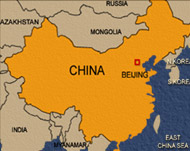Marketing the Olympics
Wang Shu has many counterfeit goods in her stall in central Beijing’s Silk Market.

Popular with tourists and locals alike, her collection of Nike shirts and North Face jackets sell well, often netting her several hundred dollars a day.
There is, though, one logo missing from her stall, a logo that embodies everything China has become over the last two decades – the 2008 Olympic Games official emblem.
Nicknamed the ‘dancing jing’, it depicts the Chinese character for Beijing as a running figure evoking images of both traditional Chinese culture and contemporary athletic prowess.
“No one here will touch it, it would be economic suicide,” rationalises Wang Shu – and she is right.
International brands
The authorities do little to stop the virulent trade in international name brands, but when it comes to protecting the future symbol of China they are taking no chances, and for good reason.
The official Beijing Organising Committee (BOC) has just launched its Olympic marketing campaign with the hope of attracting leading companies.
Participants are expected to pay handsomely for the honour of being an official sponsor at an event that will receive unprecedented coverage.
The BOC literature states a reported 3.7 billion people in 220 nations will tune in to watch the spectacle.
Surveys have equated ‘determination’, ‘honourable’ and ‘being the best’ as being the characteristics most associated with the Olympics.
Desirable attributes
These, surely, are attributes any multinational company cannot afford to be without.
“The real carrot here is the whole, we are the ‘biggest market’ attitude,” explains Julian Lapka, strategic planner for advertising specialists, Saatchi and Saatchi.
“The problem is companies do not know why they should shell out millions of dollars to be an official sponsor. Every time it gets more expensive and there are so many ways around spending the money but still gain association from the Games.”
For the Athens Games in 2004, companies paid between $14 and $70 million for top-level sponsorship.
 |
|
With one billion people, China is |
Companies who pitch themselves as mere ‘supporters’ of an event, however, have become a common sight at international competitions such as the Olympics or Football World Cup giving their brands the association but without the cost.
Prestige
“The trick is,” according to Julian Lapka, “to offer something different, you have to add value to the deal.”
At BOC headquarters in Beijing, Project Manager of Sponsorship, Sun Jian is confident they will reach their target – though, rather cryptically, would not say what the exact target was.
However, it is believed though to be around $200 million.
“Sponsors are entering into a five-year marketing contract where not only will they be able to use the logo on their products but we will offer them fantastic national coverage and they will gain great prestige in China from being associated with 2008,” Jian says.
In a country where there are several hundred TV stations, all of which are state controlled, it is to be believed that such access can be provided.
Multinationals
Already, a number of multinational companies have signed on the dotted line including Coca Cola, Kodak and Visa, many of them familiar names when it comes to Olympic association.
For the BOC, however, the trick to achieving a modicum of financial success will be to attract some local teams.
According to Sun Jian, there have been a number of Chinese companies who have expressed interest and talks are ongoing.
Echoing the official BOC literature, Sun Jian stressed Chinese patriotism as being a main reason for sponsorship. “National sponsors will gain association with the Chinese team enhancing national pride and recognition for the brand.”
Yet, if the fees commanded for sponsorship are higher than those for Athens, as trends would anticipate, how many local companies will be able to afford it?
Promotion
“For local companies that go in, it will have to be about the international market,” suggests Julian Lapka, “there are only a few at present who would be suitable.”
While foreign companies may use the Games as a base to promote themselves in China, the biggest benefit for Chinese companies will not just be further national prestige but global awareness on a hitherto unobtainable level.
|
“You can expect counterfeiters to be strictly treated if they break the law” Sun Jian, Project Manager of Sponsorship, BOC |
It remains to be seen which Chinese companies will participate but two possible candidates who are not lacking in financial clout, Legend, the computer maker and Haier, the household appliance manufacturer both refused to comment at this stage.
In addition to media coverage, one of the greatest concerns for sponsors is counterfeiting.
In a country where the likes of Wang Shu cost firms an estimated $16 billion a year in lost revenue, what is to stop the logo being reproduced on two-dollar T-shirts and be subsequently debased as an image?
Counterfeiters
“You can expect counterfeiters to be strictly treated if they break the law”, said Sun Jian ominously.
A reported fine of RMB 50,000 ($6000) will be levied on anyone caught selling items using the logo and given the absence of it among the normally opportunistic stallholders it can be supposed that this time the authorities really mean it.
Instead, the BOC will market their own products in an attempt to get back some of the costs involved – no mean feat given that Beijing is spending $34 billion to help prepare for the Games.
Not to worry, says Julian Lapka.
“Whereas in the West, governments will look to get their money back, here the BOC really will not care. The Games will give the city such a boost in terms of infrastructure, PR and foreign contacts.
Look back over the past few years and see what has been achieved, WTO membership, entry to the World Cup and now, the Olympics. It is China’s way of saying, we made it.”